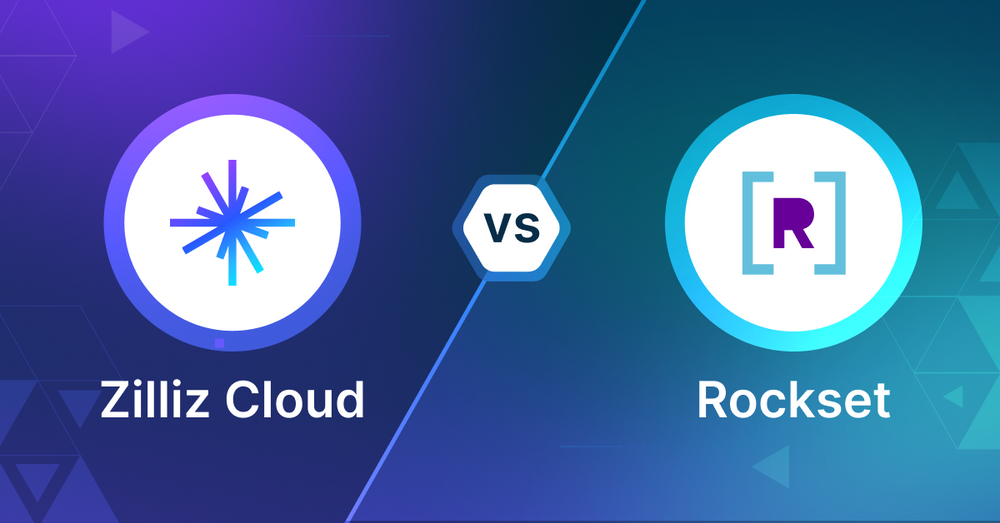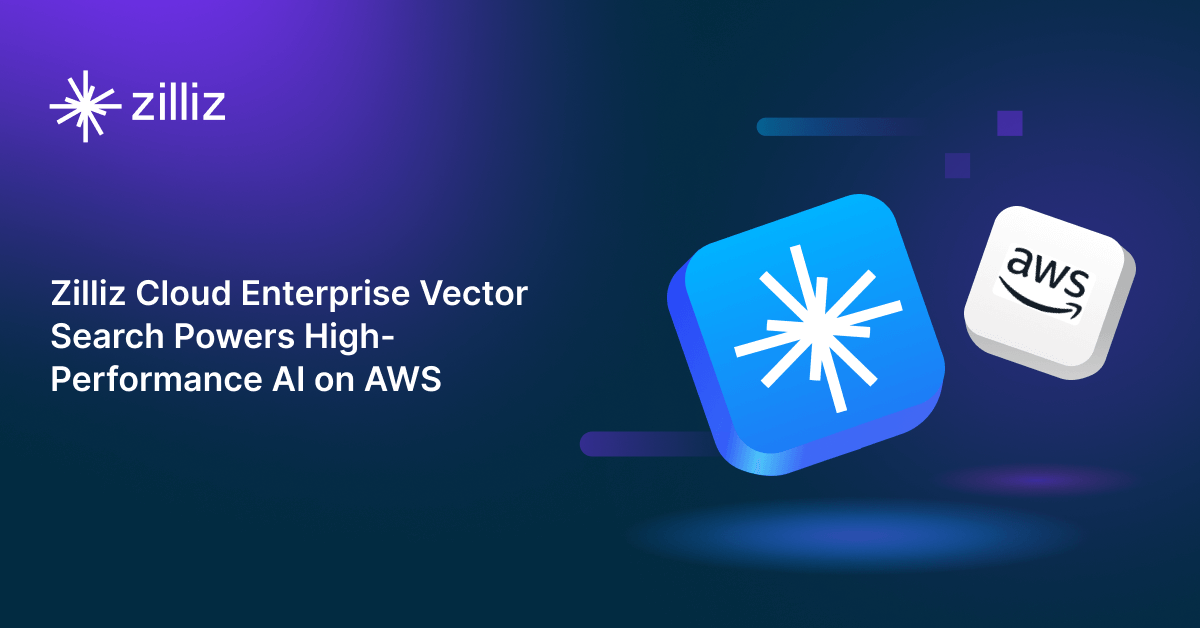Zilliz Cloud vs Rockset Choosing the Right Vector Database for Your AI Apps

What is a Vector Database?
Before we compare Zilliz Cloud and Rockset, let's first explore the concept of vector databases.
A vector database is specifically designed to store and query high-dimensional vectors, which are numerical representations of unstructured data. These vectors encode complex information, such as the semantic meaning of text, the visual features of images, or product attributes. By enabling efficient similarity searches, vector databases play a pivotal role in AI applications, allowing for more advanced data analysis and retrieval.
Common use cases for vector databases include e-commerce product recommendations, content discovery platforms, anomaly detection in cybersecurity, medical image analysis, and natural language processing (NLP) tasks. They also play a crucial role in Retrieval Augmented Generation (RAG), a technique that enhances the performance of large language models (LLMs) by providing external knowledge to reduce issues like AI hallucinations.
There are many types of vector databases available in the market, including:
- Purpose-built vector databases such as Milvus, Zilliz Cloud (fully managed Milvus)
- Vector search libraries such as Faiss and Annoy.
- Lightweight vector databases such as Chroma and Milvus Lite.
- Traditional databases with vector search add-ons capable of performing small-scale vector searches.
Zilliz Cloud is a purpose-built vector database. Rockset is a search and analytics database with vector search capabilities as an add-on. This post compares their vector search capabilities.
Zilliz Cloud: Overview and Core Technology
Zilliz Cloud is a fully managed vector database service built on top of the open-source Milvus engine. It helps developers and organizations to handle large scale AI applications by storing, managing and searching vector embeddings efficiently. It takes care of infrastructure for you, so you can focus on building AI features instead of managing databases.
One of the key advantages of Zilliz Cloud is the automatic performance optimization. The system has AutoIndex technology which will choose the best indexing method for your data and use case. So you don’t have to spend time tuning parameters or comparing different index types. The platform also uses IVF (Inverted File) and graph-based techniques to speed up similarity search across large datasets.
The platform has enterprise features. You can deploy your vector databases across AWS, Azure or Google Cloud, with options to use Zilliz’s fully managed service or bring your own cloud account (BYOC). For organizations that handle sensitive data, Zilliz Cloud has security controls like encryption, access management and compliance tools. The system also supports different consistency levels so you can balance between fast updates and strong data consistency based on your needs.
Cost management is another important aspect of Zilliz Cloud. The platform uses tiered storage to automatically move less accessed data to cheaper storage options, so you can reduce cost without affecting performance. You can also choose compute resources that match your workload - for example, use more powerful instances for heavy processing tasks and lighter ones for simple queries. This flexibility helps you to optimize your spending while maintaining good performance.
For AI applications that need to search different types of data together, Zilliz Cloud supports hybrid search. You can search across text embeddings, image vectors and other data types in a single query. The platform also supports various similarity metrics like Cosine, Euclidean and Inner Product so it’s suitable for different machine learning models and use cases. As your data grows, the system can scale horizontally by adding more resources automatically so you can maintain good performance even under heavy workload.
Rockset: Overview and Core Technology
Rockset is a real-time search and analytics database for structured and unstructured data, including vector embeddings. Its sweet spot is ingesting, indexing and querying data in real-time so it’s great for applications that need up-to-the-second insights. Rockset supports both streaming and bulk data ingestion, can process high velocity event streams and change data capture (CDC) feeds in 1-2 seconds.
One of Rockset’s key features is Converged Indexing built on mutable RocksDB. This allows for in-place updates of vectors and metadata so it’s super efficient for scenarios where data changes frequently. Rockset can handle documents up to 40MB and supports vector dimensionality up to 200,000 so it’s good for a wide range of vector embedding use cases.
Rockset has vector search built into the core. It supports K-Nearest Neighbors (KNN) and Approximate Nearest Neighbors (ANN) search methods and uses a distributed FAISS index for scalability. Rockset is algorithm agnostic, so you can choose your own search implementation. The cost-based optimizer can dynamically choose between KNN and ANN search methods for optimal performance.
What’s unique about Rockset for vector search is the Converged Index which combines search, ANN, columnar and row indexes into one. This means you can handle a wide range of query patterns out of the box. Rockset also supports metadata filtering and hybrid search. The optimizer will choose the most efficient query path. Can search across multiple ANN fields, supports multi-modal models and has both SQL and REST APIs for query interface.
Key Differences
Scalability and Performance
Zilliz Cloud scales horizontally by adding resources as needed. Its tiered storage moves less accessed data to cheaper storage without performance impact.
Rockset scales through its distributed FAISS index and Converged Index architecture. Its cost-based optimizer can switch between search methods for best performance.
Flexibility and Customization
Zilliz Cloud deploys on AWS, Azure or Google Cloud. Users can choose fully managed or bring their own cloud account (BYOC).
Rockset is algorithm agnostic, users can use their preferred search methods. It supports multiple query interfaces through SQL and REST APIs.
Integration and Ecosystem
Zilliz Cloud integrates with major cloud providers and supports various machine learning models through its flexible similarity metrics.
Rockset excels in real-time data integration scenarios, supports streaming data and CDC feeds. Works well in environments where data needs to be updated quickly and real-time analytics.
Ease of Use
Zilliz Cloud reduces management overhead with AutoIndex and automated performance optimization. No need to tune parameters or compare index types manually.
Rockset has a simple setup with its Converged Index which handles all query patterns without additional configuration.
Cost
Zilliz Cloud uses tiered storage and flexible compute resource allocation to help with cost optimization. Users can match resources to workload.
Rockset pricing is based on data volume and query complexity. In-place update can reduce storage cost for frequently updated data.
Security
Zilliz Cloud has enterprise grade security with encryption, access management and compliance tools. Supports different consistency levels to balance between update speed and data consistency.
Rockset includes standard security features like encryption and access controls, though specific details should be verified based on your requirements.
Key Takeaways for Zilliz Cloud and Rockset
When to Choose Zilliz Cloud
Choose Zilliz Cloud for AI applications that are all about vector embeddings, especially when you need auto-scaling and auto-optimization. It’s perfect for companies building recommendation systems, image similarity search or semantic text search at scale. The platform is great when you need enterprise features like cross-cloud deployment, strong security controls and cost optimization through tiered storage. Zilliz Cloud is for projects that require minimal infrastructure management and high performance on vector ops.
When to Choose Rockset
Choose Rockset when you need real-time data processing and vector search. It’s good for use cases with frequent data updates, streaming analytics or when you need to combine traditional db ops with vector similarity search. Rockset is great for fast data ingestion and immediate search availability so it’s good for real-time analytics dashboards, log analysis systems or dynamic content recommendation engines that need up to the second accuracy.
Conclusion
Zilliz Cloud is good for pure vector search with auto-optimization, enterprise features and scalable architecture. Rockset is good for real-time data processing and hybrid search. Your choice between these two should be based on your use case requirements around data update frequency, response time and whether vector search is your main use case or part of a broader data processing strategy. Both have strong vector search but their data handling and optimization approaches are different so they are good for different types of applications and companies.
Read this to get an overview of Zilliz Cloud and Rockset but to evaluate these you need to evaluate based on your use case. One tool that can help with that is VectorDBBench, an open-source benchmarking tool for vector database comparison. In the end, thorough benchmarking with your own datasets and query patterns will be key to making a decision between these two powerful but different approaches to vector search in distributed database systems.
Using Open-source VectorDBBench to Evaluate and Compare Vector Databases on Your Own
VectorDBBench is an open-source benchmarking tool for users who need high-performance data storage and retrieval systems, especially vector databases. This tool allows users to test and compare different vector database systems like Milvus and Zilliz Cloud (the managed Milvus) using their own datasets and find the one that fits their use cases. With VectorDBBench, users can make decisions based on actual vector database performance rather than marketing claims or hearsay.
VectorDBBench is written in Python and licensed under the MIT open-source license, meaning anyone can freely use, modify, and distribute it. The tool is actively maintained by a community of developers committed to improving its features and performance.
Download VectorDBBench from its GitHub repository to reproduce our benchmark results or obtain performance results on your own datasets.
Take a quick look at the performance of mainstream vector databases on the VectorDBBench Leaderboard.
Read the following blogs to learn more about vector database evaluation.
Further Resources about VectorDB, GenAI, and ML
- What is a Vector Database?
- Zilliz Cloud: Overview and Core Technology
- Rockset: Overview and Core Technology
- Key Differences
- Key Takeaways for Zilliz Cloud and Rockset
- Conclusion
- Using Open-source VectorDBBench to Evaluate and Compare Vector Databases on Your Own
- Further Resources about VectorDB, GenAI, and ML
Content
Start Free, Scale Easily
Try the fully-managed vector database built for your GenAI applications.
Try Zilliz Cloud for FreeKeep Reading

Data Deduplication at Trillion Scale: How to Solve the Biggest Bottleneck of LLM Training
Explore how MinHash LSH and Milvus handle data deduplication at the trillion-scale level, solving key bottlenecks in LLM training for improved AI model performance.

Zilliz Cloud Delivers Better Performance and Lower Costs with Arm Neoverse-based AWS Graviton
Zilliz Cloud adopts Arm-based AWS Graviton3 CPUs to cut costs, speed up AI vector search, and power billion-scale RAG and semantic search workloads.

Zilliz Cloud Enterprise Vector Search Powers High-Performance AI on AWS
Zilliz Cloud delivers blazing-fast, secure vector search on AWS, optimized for AI workloads with AutoIndex, BYOC, and Cardinal engine performance.
The Definitive Guide to Choosing a Vector Database
Overwhelmed by all the options? Learn key features to look for & how to evaluate with your own data. Choose with confidence.